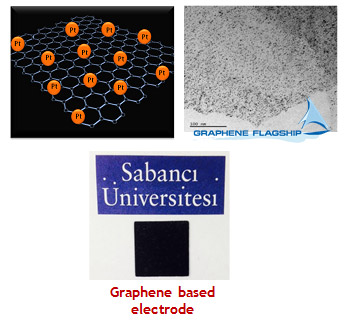Despite enormous progress in polymer electrolyte membrane (PEM) fuel cells, development of catalysts with maximum activity and durability and minimum loading are still the core challenges. Catalyst supports are also very important in this respect. Generally, proper catalyst support materials must have large specific surface areas to support catalyst nanoparticles, high electrical conductivity to promote fast electron transfer, strong affinity towards the nanoparticles and stability under the operating conditions to provide stable catalyst structures.
The most commonly used catalyst support material is commercial carbon blacks. However, carbon blacks have various drawbacks and limitations which cause the degradation of catalyst activity and performance.
Graphene, the two dimensional allotrope of carbon, exhibits excellent electrical, thermal and mechanical properties and large surface area. It is expected that the unique structure and properties of graphene can fulfill all the requirements of an ideal catalyst support.
Platinum (Pt) nanoparticles have been known as the best catalyst for especially for oxygen reduction reaction at the cathode. However, Pt is still the most expensive component of PEM fuel. In this respect, we develop graphene based electrodes and electrode fabrication methods to enhance the dispersion, utilization and the durability of the Pt catalyst at the same time to reduce the Pt loading. The reduction of catalyst amount in the electrode without sacrificing the performance and thus lowering the cost of fuel cell is the ultimate goal
Surface area and catalytic activity of supported nanoparticles depend on preparation method. In this project, impregnation methods based on reduction of suitable Pt-precursors have been employed.
The resultant graphene supported Pt nanoparticles have exhibited superior properties compared to commercial carbon black supported Pt nanoparticles. Uniform distribution of Pt nanoparticles and enhanced electrocatalytic activities have been achieved.
The work is supported by the Project Grant:
Graphene-Driven Revolutions in ICT and Beyond-EU Future Emerging Technology (FET) Graphene Flagship, 2013-…, supported by EU (FP7 and Horizon 2020) (PI: S. Alkan Gürsel)

- Log in to post comments